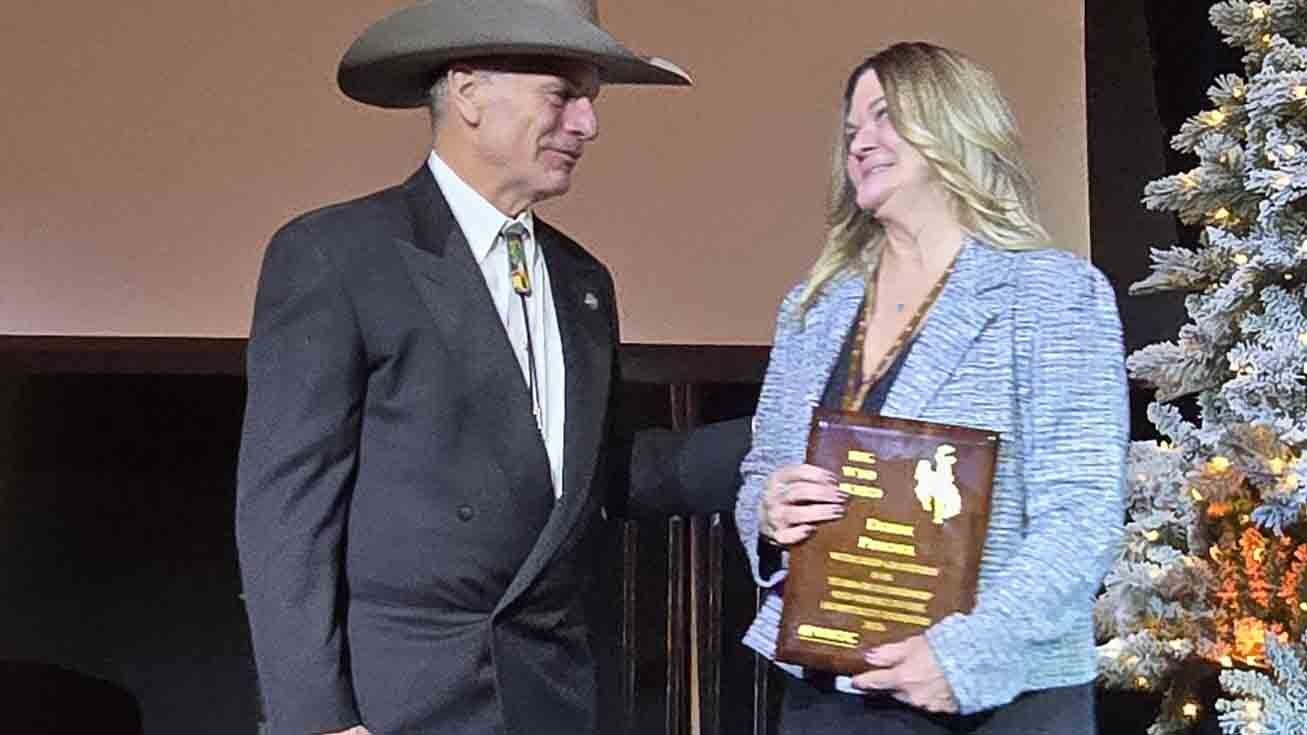There is an angry bird perched just above E Street along Interstate 25 in the Oil City.
A person in a disgruntled-looking white chicken costume holds an AR-15 rifle and threatens people who eat meat.
“If bacon and burgers don’t get you, I may,” reads the large digital billboard, insinuating that the chicken may blow people away if they keep eating real meat.
Then in smaller letters, the billboard urges people to go vegan to avoid contracting avian flu.
“Bird flu kills. Please, try vegan,” it says, followed by the logo for People for the Ethical Treatment of Animals (PETA).
It’s a provocative message that plays on two issues Wyomingites feel very strongly about: eating meat and guns.
That’s the point, said PETA Vegan Campaign Project Manager Amber Caravan. She told Cowboy State Daily that the billboard in Casper is one of many the group has put up targeting areas around the country where avian flu has been detected.
“We are putting up advertisements across the country in the face of this avian flu outbreak that so far is among chickens, turkeys and now cows used for their milk because it is beginning to spill over into humans,” Caravan said. “Our ad reminds people that eating meat fuels the demand for these filthy factory farms where these pathogens like the avian flu thrive and that the easiest way for people to prevent development of these animal borne diseases is to avoid meat like the plague and go vegan.”
The Wyoming Department of Agriculture in June reported there had been a case of avian influenza in a dairy herd. Wyoming State Veterinarian Dr. Hallie Hasel told Cowboy State Daily that one herd of dairy cattle remains under quarantine. She confirmed there has been no human transmission.
Wyoming Department of Public Health spokesperson Kim Deti said workers at the quarantined dairy farm have been provided education and personal protection equipment. She said her department has no concerns about eating chicken.
“Our department, as well as national experts, do not have a current concern related to bird flu about eating properly handled and cooked poultry products,” she said.

But Why?
Except for making a political statement or simply antagonizing a large number of people, many in Wyoming question why PETA would put an anti-meat billboard up in Casper, Wyoming.
Wyoming Stock Growers Association Executive Vice President Jim Magagna said the message is just “fake information” and propaganda.
“It is just PETA trying to serve their purpose to stop meat consumption,” he said. “It’s not unlike what they tried to do over in Sweetwater County where they tried to put up a sign to get you stop eating meat because your briefcase was made with leather from a cow.”
Magagna was referencing a June lawsuit PETA filed against Southwest Wyoming Regional Airport because it denied the group putting up its message in the airport terminal in Rock Springs.
The proposed ad features a cow with a leather travel bag as its body with, “Was She Killed to Make Your Carry-On?” printed in large letter next to the cow, with a smaller caption that says, “Cruelty doesn’t fly — Choose vegan.”
PETA claims the airport board’s decision violated its free speech rights and was unconstitutional, a claim the board has denied.
Magagna said bird flu is strictly in dairy cattle and there is no evidence of it in beef cattle. He said all of the products from his association are “properly inspected and cared for.”
He doesn’t buy PETA’s claim the billboard is a message about bird flu safety. It’s all about being anti-meat.
The bird flu is “not a human health risk, it’s strictly a way for them to promote ceasing consumption of red meat,” he said. “Fortunately, the vast majority of the public does not buy into that and they maintain their loyalty to beef and other red meats because they are not only tasty, but they are healthy.”
Magagna said with Wyoming being a conservative state, and one that is supportive of the cattle industry that likes to eat meat, it may seem a natural target for PETA. But it’s also more likely to draw criticism and derision than convert people in the Cowboy State to veganism.
How Much Of A Risk Is It?
The Centers for Disease Control and Prevention reports that nationwide, there have been 14 reported human cases of bird flu in the United States, four following exposure to dairy cows and 10 from exposure to poultry with the disease.
“Bird flu viruses do not normally infect humans, although there have been some rare cases,” the agency reports. “Infected birds shed virus through their saliva, mucous and feces. Human infections can happen if the virus then gets into a person’s eyes, nose or mouth, or is breathed in.”
Caravan said PETA targeted meat producing states such as Wyoming and Texas for its billboards because those are the “exact places” where conversations about the meat industry need to happen.

‘Local Sources’
At Frank’s Butcher Shop in Casper, General Manager Bryce Brenton said the PETA billboard “is really pushing this propaganda that you shouldn’t be eating meat.”
“We take the point that you should know where your food comes from and not necessarily this factory farm stuff,” he said. “You should know that it comes from your local source like a Wyoming rancher and processed at a Wyoming facility and sold at a Wyoming store.”
Casper Chamber of Commerce President Tina Hoebelheinrich agrees with Brenton that the message most in Wyoming would take away isn’t to give up meat, but to buy local meat.
“It just goes to support the idea of of shopping and eating locally,” she said. “Know where your food comes from. As much local business, local ranchers, local farmers that we can support, I think the better.”
Johnny J’s Diner owner Pat White sells a lot of broasted chicken and uses chicken in many other recipes. She said the PETA billboard hasn’t seem to impact her business at all.
“There has been absolutely no effect on our business,” she said. “And our chicken actually comes from validated and tested vendors.”
Caravan said the billboard will remain up for about a month.
Dale Killingbeck can be reached at dale@cowboystatedaily.com.





